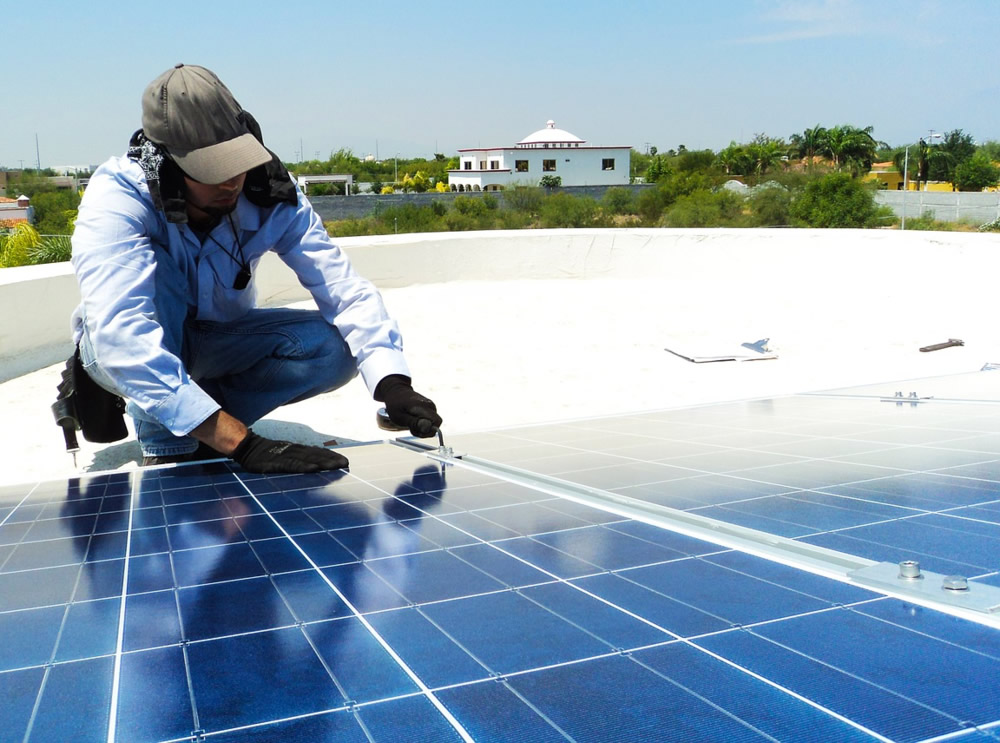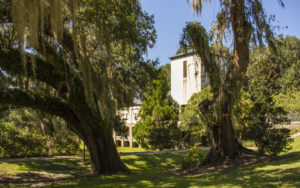NEWS: Few obstacles remain for solar bill in the Senate
BRIEFS: : Black farmers to meet, selling Santee Cooper, more
TALLY SHEET: Santee Cooper in the sights of legislative leaders
COMMENTARY, Brack: Lack of gun reform in U.S. is downright embarrassing
SPOTLIGHT: The South Carolina Education Association
FEEDBACK: Send us your thoughts
MYSTERY PHOTO: Republicans?
S.C. ENCYCLOPEDIA: Mepkin Abbey
NEWS: Few obstacles remain for solar bill in the Senate

By Lindsay Street, Statehouse correspondent | A compromise is in the works in a Senate Judiciary subcommittee where a major House solar bill is hung up on a single issue.
“We want the opportunity to grow solar in South Carolina but we want to put the very best processes to do that,” Senate Judiciary subcommittee Chair Sen. Mike Gambrell, R-Anderson, said Wednesday.
The bill seeks to make solar power more accessible for those looking to install rooftop systems and to help solar-generating plants become more competitive.
At issue in the bill, called the “South Carolina Energy Freedom Act,” is whether the state should mandate contract lengths between utilities and solar providers. Opponents of the current language called it “bad public policy” that shields private companies from market fluctuations.
Solar proponents appear willing to work toward a compromise in the subcommittee, but one group called fears over the contract length a “scare tactic.”
“There’s a general consensus of support for the bill,” Orangeburg Democratic Sen. Brad Hutto told Statehouse Report. “We need to have legislation in this area to promote solar and interconnectivity, (but) it’s a complicated subject matter and there are a lot of stakeholders.”
One of three big legislative priorities
Energy policy is one of three big issues the Senate is looking to resolve before summer recess, Senate Majority Leader Shane Massey, R-Edgefield, said. The other two large items are education reform and the state’s annual budget. Education reform could come to the Senate floor in the next two weeks, and the budget will likely be taken up before Easter, April 21, Massey said. That leaves little time to get the proposed legislation through the Senate prior to the budget, but there would be time at the end of session to get the bill voted on.
“I’m hopeful that we will be able to get a vote on some language at the next meeting,” Massey said.
Hutto and Massey felt confident a compromise could be reached as early as the next subcommittee meeting, which is slated for after adjournment of the Senate March 28 in room 308 of the Gressette building.
Detail about the bill
Most of South Carolina’s solar generation comes from rooftop solar, but there has been a 20-fold increase in 2017 in utility-scale solar generation, according to a federal report. The House bill, which received unanimous support before heading to the Senate, deals with both sectors.

The bill could allow for expansion of solar-derived energy in the state, a burgeoning industry with thousands of jobs connected to it. Conservation Voters of South Carolina (CVSC) Executive Director John Tynan said the bill could “drive millions if not billions of private investment” and would create more competition in the energy sector.
The bill establishes rights for electrical utility customers, provides for judicial review of the violation of electrical utility customer’s rights, and establishes procedures for periodic hearings to review and approve electrical utilities’ contracts.
Most importantly to many rooftop solar advocates, the bill removes a solar leasing cap, which currently mandates utilities only have to reimburse customers fully for electricity generation until the state’s solar rooftop units supply more than 2 percent of its average peak demand and the reimbursements would only be guaranteed through 2025. In the bill, those who install rooftop solar before the 2 percent of average peak demand and within the next two years would be guaranteed set rates, Tynan said. He added this will give rooftop solar residences “certainty” of electricity generation reimbursement.
According to a Feb. 20 report from the state Revenue and Fiscal Affairs Office, the bill would increase costs at the Office of Regulatory Staff by $356,800 with the hiring of four full-time employees and additional expenses. The report said there would be an “undetermined amount” increased for the Public Service Commission, which reviews utility contracts in the state.
While solar advocates like Tynan worry the Senate could still prove tough for the bill to pass — a similar bill got tied up in debate on the floor last year — panel members signaled willingness to move forward this week.
‘Bad public policy’ vs. ‘scare tactic’
Much of the debate in the subcommittee comes down to the mandated 10-year contract between S.C. investor-owned utilities and solar-generating companies. According to the bill, the mandated contract length is only in place until solar generation reaches 20 percent of average peak demand. The idea behind the contract length is to help solar-generating power producers compete and secure financing.

The contract-length mandate killed the bill in the Senate last year with the help of York Republican Sen. Wes Climer. He is serving on the subcommittee reviewing the bill.
Climer still opposes any legislatively-mandated contract length in the bill.
“It is bad public policy to enshrine in statute that would take a future act of the General Assembly the contract duration between two private parties,” Climer said. He added he was willing to soften the language that guided the state’s Public Service Commission on the contracts, however. “(But) if the millionaire solar developers insist on having ratepayers guarantee their profits regardless of what happens in the market, there will not be a bill this year.”
Tynan’s group called the opposition to the set contract length a “scare tactic.” The group contends that short contract lengths can be used to stifle solar generation development as independent producers seeks bank financing to meet contract obligations. According to CVSC, which cited a state Office of Regulatory Staff report, making contract lengths shorter will not help improve rates for ratepayers.
Climer said a compromise that creates a more market-based solution and protects ratepayers would “sail through the Senate,” but once a compromise is reached, there may be a few more obstacles.
“(The mandated contract length) is a big issue but it’s not my only issue,” Climer said. He noted that he also didn’t like that rooftop solar residences are guaranteed a one-to-one electricity generation compensation. He said that their reimbursement of their electricity generation does not take into account paying for infrastructure and its maintenance, putting that cost on other ratepayers.
Climer said his opposition is tied to his desire to protect ratepayers, not shield solar generation companies from market fluctuations or give rooftop solar customers an edge over other ratepayers.
- Have a comment? Send to: feedback@statehousereport.com
NEWS BRIEFS
Black farmers to meet; Selling Santee Cooper; More

By Lindsay Street, Statehouse correspondent | South Carolina’s black farmers need more support after decades of land loss and loan discrimination, especially as a younger generation is drawn back to the land as part of a food equality and social justice movement, according to farming advocates.
“A lot of black farmers these days are in urban areas and substantially under-resourced,” “Farming While Black” author Leah Penniman said. “People’s farms are constantly at risk.”
Advocates like Penniman say established and would-be black farmers need education on opportunities available to them. A piece of that puzzle will be available March 26 at the inaugural S.C. Black Farmers Conference at S.C. Society Hall in Charleston and at Fresh Future Farm in North Charleston. The conference seeks to bring food-growing experts from across the country to share their best practices with new, budding and established S.C. growers. Penniman will be the keynote speaker at the event.
State Department of Agriculture spokesman Clint Leach said the agency currently helps black farmers through multiple grants to black farms, and through programs like SC Farmlink and the New and Beginner Farmer Program are not specific to black farmers, but can help connect farmers to land and help support farmers,
S.C. Rep. Marvin Pendarvis, a North Charleston Democrat who sits on the House Agriculture Committee, said he plans to introduce legislation that will support an urban agriculture program in the state that will target students and inmates.
“We’ve got to create opportunity. Opportunity today creates prosperity tomorrow but we have to create that opportunity,” Pendarvis said.
Pendarvis said S.C. black farmers are still experiencing fallout from Jim Crow-era discrimination, whether that be from inability to secure loans for farming, land loss or urban migration. He said black farmers today are also burdened by requests for documentation in the loan process.
- For more information about the conference, visit freshfuturefarm.org.
In other recent news:
![]() Santee Cooper surprise. Some state senators expressed surprised at a Wednesday resolution introduced by Senate President Harvey Peeler of Cherokee and supported by Finance Chair Hugh Leatherman of Florence. It would delegate sale of Santee Cooper to the governor’s office. By legislative mandate, only the legislature has the authority to sell the public utility. Then on Thursday, the House countered with a resolution encouraging the sale of the utility — but through the General Assembly. The two resolutions, which sparked strong emotions on all sides, will be weighed in committee next week.
Santee Cooper surprise. Some state senators expressed surprised at a Wednesday resolution introduced by Senate President Harvey Peeler of Cherokee and supported by Finance Chair Hugh Leatherman of Florence. It would delegate sale of Santee Cooper to the governor’s office. By legislative mandate, only the legislature has the authority to sell the public utility. Then on Thursday, the House countered with a resolution encouraging the sale of the utility — but through the General Assembly. The two resolutions, which sparked strong emotions on all sides, will be weighed in committee next week.
- The Senate Finance Committee will review 678 upon adjournment of the Senate March 27 in room 105 of the Gressette building; and,
- The House Ways and Means Revenue Policy Legislative subcommittee will review 4287 11 a.m. March 26 in room 521 of the Blatt building.
Predating both of those meetings, the Santee Cooper Board of Directors will meet 8 a.m. March 25. Live streaming of the meeting is available here.
Poll offers a few surprises. Winthrop University’s latest poll of S.C. residents shows some things everyone knows about South Carolina, and some things that may be surprising when viewing the state through red-colored glasses. Here are some of the interesting takeaways:
- S.C. Republicans have a strong support of President Trump (80 percent) and U.S. Sen. Lindsey Graham (74 percent);
- Henry McMaster has a 52 percent approval rating and the General Assembly has a 43 percent approval rating among poll respondents;
- Nearly 60 percent of Winthrop Poll respondents said our country is headed in the wrong direction;
- Two-thirds of South Carolina residents said our country’s economy is very good or fairly good;
- Of those surveyed, 80 percent said they would support legislation that would require a completed background check before a person is sold a gun; and,
- More than 70 percent of respondents said a woman should be able to receive an abortion as the result of rape or incest, or if her life is threatened by the pregnancy, but only 40 percent of respondents said a woman should be able to receive an abortion as the result of an unplanned pregnancy.
 2020 Early State News
2020 Early State News
Want to know more about what’s happening in the 2020 presidential primary process in South Carolina?
You can keep up with the latest in 2020 presidential election news a by signing up for our new free daily news roundup. Subscribe.
Weekly update on Palmetto Priorities
 Throughout the legislative session, we’ll provide you relevant updates related to our list of Palmetto Priorities, which are 10 big policy areas where major progress is needed for South Carolina to escape the bottom of lots of lists. Over the last week:
Throughout the legislative session, we’ll provide you relevant updates related to our list of Palmetto Priorities, which are 10 big policy areas where major progress is needed for South Carolina to escape the bottom of lots of lists. Over the last week:
ENVIRONMENT: Ban on plastic bag bans revived. Sens. Scott Tolley, R-Spartanburg, and Wes Climer, R-York, have re-introduced a bill that would freeze future and rescind current municipal bans on single-use plastic and foam containers. A similar bill failed last year. Read more.
HEALTH CARE, PART I: Medical marijuana. A Senate subcommittee advanced the S.C. Compassionate Care Act this week. But as previously reported, the bill could easily die in the House. The Post and Courier also reported this week that powerful lobbyists could help the House kill the bill should it pass the Senate.
HEALTH CARE, PART II: Abortion ban revived. A House panel considered a bill Thursday that would ban abortions after six weeks of pregnancy. The legislation would ban abortions once a heartbeat is detected in the fetus, and it’s known as the “heartbeat” bill. Read more.
TAXES: House panel continues work. A special committee in the House is hoping to soon introduce legislation that will cut the state’s 6 percent sales tax in half to 3 percent, partly by eliminating some sales tax exemptions.
CORRECTIONS: Prison officials talk inmate snafu. After 10 inmates were mistakenly released early from state prisons, officials talked to lawmakers this week about what led to the mistake and steps needed to correct it. One employee pointed to unclear court records. Prison officials say there are fixes in the works, but requested more money to raise salaries to hire better workers. Read more.
Looking ahead
Alliance Party organizing March 23. The party formerly known as the American Party of South Carolina — which has not merged into the new Alliance Party — is holding an organizational meeting 1 p.m. to 5 p.m. March 23 at the Columbia Conference Center. The group says it holds core values of common ground, term limits, campaign finance reform, and “public service-motivated” candidates. More info.
Click below for other items coming up in the Statehouse:
- House calendar
- Senate calendar
- Have a comment? Send to: feedback@statehousereport.com
Santee Cooper in the sights of legislative leaders
![]() Staff reports | The possibility of a sale of the public utility Santee Cooper got legislative attention this week with several newly-filed bills by legislative leaders:
Staff reports | The possibility of a sale of the public utility Santee Cooper got legislative attention this week with several newly-filed bills by legislative leaders:
- H. 4261(McCoy) is a bill that would allow the major utility facilities of Santee Cooper to be sold, with several other provisions and lots of sections, including creation of a review and oversight commission.
- H. 4287(Lucas) would author a Santee Cooper committee to receive and approve an offer to purchase assets, with several provisions.
- S. 678(Peeler) would allow the governor to use a competitive bidding process to sell Santee Cooper, with several provisions.
- S. 697(Rankin) seeks a law prohibiting the sale of Santee Cooper without the advice and consent of the General Assembly.
Other new bills
Members of the General Assembly filed just over 80 new bills and resolutions over the last week from the formal filing of the state budget to bills dealing with presidential primaries and ethics reform. Among the highlights:
Work and save. H. 4258 (Ballentine) seeks a new state “Work and Save Retirement Savings Plan” with several provisions to set up and administer the savings program.
FOI law. H. 4259 (Fry) seeks to include toxicology reports from DUI arrests for public officials to become public information under state law, with other provisions.
Ratepayer protection. H. 4260 (Caskey) is a complicated, multi-faceted proposal that seeks to provide protection to public utility employees who report wrongdoing and to set qualification standards for the state’s consumer advocate and many other provisions.
Wireless. H. 4262 (Simrill) seeks to enact a small wireless facilities deployment law that would govern operation of small wireless facilities, and several other provisions.
Nursing. H. 4278 (Lowe) seeks to allow advanced practice registered nurses to perform specific medical acts pursuant to approved guidelines, with several provisions.
Election security. H. 4293 (Rutherford) seeks to establish a state Election Security Council and call for the state’s election system to use paper-based balloting, with several provisions.
DSS reform. S. 680 (Shealy) is a long, complicated proposal that would update and reform state caregiver laws, including requirements, registration, inspections, compliance, licenses, penalties and much more.
Port enhancement. S. 691 (J. Matthews) seeks a Port Enhancement Zone Act that would provide a new enhancement zone and make tax law changes that would boost tax credits and more, with many provisions.
Find any bill
COMMENTARYBRACK: Lack of gun reform in U.S. is downright embarrassing

By Andy Brack, editor and publisher | It took New Zealand less than a week to ban assault-style rifles following a deadly slaughter at two mosques. As a comparison, South Carolina and Congress have been doing nothing but dilly-dallying for almost four years since Charleston’s own horrific massacre.
 It’s downright embarrassing that we are so hogtied with inaction.
It’s downright embarrassing that we are so hogtied with inaction.
It’s way past time to close the so-called Charleston loophole brought into the limelight in 2015 after South Carolina’s Dylann Roof shot 12 worshippers at Emanuel AME Church in Charleston, killing nine. Roof was able to purchase a gun because a background check took longer than three days. Closing the loophole would require a background check to be completed before the sale of a gun.
This is plain common sense. And tightening a loophole should be much less difficult than banning some weapons completely as New Zealand did.
Yet we fiddle. And more guns get sold to people who shouldn’t have them. According to Time magazine, “4,170 guns were sold to people with criminal records, mental illnesses and other circumstances which should have prevented them from being able to buy a firearm.” Why did they get them: The loophole.
What’s more infuriating about the whole mess is blame for inaction can be placed squarely on lawmakers – the 170 South Carolina legislators who could do something here or the 535 members of Congress who could deal with it nationally.
 A new Winthrop Poll shows overwhelming bipartisan support among South Carolinians for closing the loophole so that people can’t get guns until background checks are finished. Some 80 percent of 1,007 adults, including 80 percent of Republicans, said they favored closing the loophole, the poll said.
A new Winthrop Poll shows overwhelming bipartisan support among South Carolinians for closing the loophole so that people can’t get guns until background checks are finished. Some 80 percent of 1,007 adults, including 80 percent of Republicans, said they favored closing the loophole, the poll said.
“Everyone – Republicans, Democrats, or otherwise – seems to have no problem with ensuring that those checks are fully completed,” said Winthrop pollster Scott Huffmon. “Such a measure ensures law-abiding citizens can still buy guns while there is an extra check on people like the Charleston murderer, who I won’t name, getting a firearm.”
Wake up, South Carolina! Wake up, America! Contact your state legislator, congressman and senator and tell them to stop fooling around and, at a minimum, to close the loophole to make our state and nation safer.
Legal abortion still has support
The new Winthrop Poll also sheds light in how South Carolinians view legal abortion.
About this phase of every legislative session, it’s typical for social issues to flare. GOP House members consistently seem to wait until they approve a budget before throwing red meat to their base by going after social issues like abortion. This year in South Carolina and in other legislatures, there’s a new twist on the old abortion debate – a push for a “personhood” bill to establish life at fertilization of an embryo and would ban all abortions.
The Winthrop Poll shows 73 percent of South Carolinians, including 67 percent of Republicans, believe a woman should be able legally to get an abortion if her doctor says the pregnancy is a threat to her health or if the fetus is not viable. Seven in 10 South Carolinians also believe a woman should be able to get an abortion for a pregnancy caused by rape or incest. Four in 10 think abortions should be available for unplanned pregnancies or if a woman doesn’t believe she is ready or able to care for a child.
“This data shows that South Carolinians are not fans of abortion, but recognize certain circumstances when legal abortion may be appropriate,” Huffmon said. “These attitudes cut against so-called ‘personhood’ bills which would outlaw all abortion and even several kinds of birth control.”
The Winthrop Poll also showed:
Trump. More South Carolinians (49 percent) disapproved of how President Donald Trump is handling his job than those who do (42 percent). Some 82 percent of Republicans backed Trump.
Lawmakers. Only 16 percent of respondents approved of how Congress is handling its job. But four in 10 South Carolinians approved of the S.C. legislature’s job performance.
Leaders. Half of South Carolinians, including 74 percent of Republicans and 25 percent of Democrats, approved of GOP U.S. Sen. Lindsay Graham’s job performance. GOP U.S. Sen. Tim Scott got a 55 percent approval rating. Just over half approved of GOP Gov. Henry McMaster’s performance.
- Have a comment? Send to: feedback@statehousereport.com.
SPOTLIGHT: The South Carolina Education Association
 The public spiritedness of our underwriters allows us to bring Statehouse Report to you at no cost. This week’s spotlighted underwriter is The South Carolina Education Association(The SCEA), the professional association for educators in South Carolina. Educators from pre-K to 12th grade comprise The SCEA. The SCEA is the leading advocate for educational change in South Carolina. Educators in South Carolina look to The SCEA for assistance in every aspect of their professional life. From career planning as a student to retirement assessment as a career teacher, The SCEA offers assistance, guidance, and inspiration for educators.
The public spiritedness of our underwriters allows us to bring Statehouse Report to you at no cost. This week’s spotlighted underwriter is The South Carolina Education Association(The SCEA), the professional association for educators in South Carolina. Educators from pre-K to 12th grade comprise The SCEA. The SCEA is the leading advocate for educational change in South Carolina. Educators in South Carolina look to The SCEA for assistance in every aspect of their professional life. From career planning as a student to retirement assessment as a career teacher, The SCEA offers assistance, guidance, and inspiration for educators.
- Learn more: http://www.thescea.org
FEEDBACK
FEEDBACK: Send us your thoughts … or rants
We love hearing from our readers and encourage you to share your opinions. But you’ve got to provide us with contact information so we can verify your letters. Letters to the editor are published weekly. We reserve the right to edit for length and clarity. Comments are limited to 250 words or less. Please include your name and contact information.
- Send your letters or comments to: feedback@statehousereport.com
MYSTERY PHOTO: Republicans?

These elephants are pink and gray, not red. So are they Republican? Where are they located? (Hint: Somewhere in South Carolina). Send your guess about the location of this photo, sent in by an alert reader, to feedback@statehousereport.com. And don’t forget to include your name and the town in which you live.
Our previous Mystery Photo
 The word “bucolic” in our March 15 mystery, “Bucolic setting,” was a clue to some savvy readers. It helped lead them to identify the mystery photo as being at Mepkin Abbey in Berkeley County. The photo was taken by Davey Borden. You can learn more about the abbey below in the S.C. Encyclopedia entry.
The word “bucolic” in our March 15 mystery, “Bucolic setting,” was a clue to some savvy readers. It helped lead them to identify the mystery photo as being at Mepkin Abbey in Berkeley County. The photo was taken by Davey Borden. You can learn more about the abbey below in the S.C. Encyclopedia entry.
Congratulations to this mystery’s 12 sleuths: Lexie Chatham of West Columbia; Philip Cromer of Beaufort; Charles Davis of Aiken; Dana Yow of Blythewood; Jay Altman and David M. Stewart, both of Columbia; Robert Ariail of Camden; George Graf of Palmyra, Va.; Faith Line of Anderson; David Lupo of Mount Pleasant; Bill Segars of Hartsville; and Dwight McInvall of Pawleys Island.
Send us a mystery: If you have a photo that you believe will stump readers, send it along (but make sure to tell us what it is because it may stump us too!) Send to: feedback@statehousereport.com and mark it as a photo submission. Thanks.
S.C. ENCYCLOPEDIA
HISTORY: Mepkin Abbey

S.C. Encyclopedia | Located on the Cooper River, Mepkin Abbey has a diverse history. In its early life the property served as the seven-thousand-acre rice plantation and family home of the eighteenth-century statesman Henry Laurens. Surviving traces of the plantation include a family cemetery and a large oak avenue.
In 1936 the noted publisher Henry Luce, who established both Time and Life magazines, purchased the property. While living at Mepkin, Luce and his wife, Claire Booth, hired the architect Edward Durell Stone to construct several buildings on the site, including a forester’s lodge, a laundry building, a pump house, and a farm manager’s house, made mostly of brick. Stone received his training at Harvard University and the Massachusetts Institute of Technology and spent his early career designing houses in the international style. The buildings at Mepkin reflect his modernist sensibility.
The Luces also hired the landscape architect Loutrel Briggs, designer of many important gardens in South Carolina, to create a formal composition of camellias and azaleas overlooking the Cooper River. In 1949 the property was donated to a religious community in keeping with Mrs. Luce’s wishes.
By the 1960s the property had become a monastery that housed the Trappist monks of the Cistercian Order. The monks of Mepkin Abbey began operating an egg farm, which was still functioning in the early twenty-first century, with several buildings on the property associated with that function. The site also includes an austere Cistercian church in the shape of a cross. In
its transition from a rice plantation to a monastery and egg farm, Mepkin Abbey reflects an unusual blending of tradition, modern aesthetics, and spiritual transcendence, making it one of the most unique places in South Carolina. [Editor’s note: The monks no longer have an egg farm. Instead, they now produce fresh and dried mushrooms. More info.]
— Excerpted from an entry Lindsey Gertz. See full discussion here. This entry may not have been updated since 2006. To read more about this or 2,000 other entries about South Carolina, check out The South Carolina Encyclopedia, published in 2006 by USC Press. (Information used by permission.)
ABOUT STATEHOUSE REPORT
Statehouse Report, founded in 2001 as a weekly legislative forecast that informs readers about what is going to happen in South Carolina politics and policy, is provided to you at no charge every Friday.
- Editor and publisher: Andy Brack, 843.670.3996
- Statehouse correspondent: Lindsay Street
More
- Mailing address: Send inquiries by mail to: P.O. Box 22261, Charleston, SC 29407
- Subscriptions are free: Click to subscribe.
- We hope you’ll keep receiving the great news and information from Statehouse Report, but if you need to unsubscribe, go to the bottom of the weekly email issue and follow the instructions.
- © 2019, Statehouse Report. All rights reserved.
















 We Can Do Better, South Carolina!
We Can Do Better, South Carolina!
Pingback: 3/22, full issue: On solar energy; Farming; Gun reform; more – Statehouse Report
Pingback: pvMB 3/25/19: Nevada’s clean electric bill signed, a new solar charging pilot program in Hawaii… and more! – pv magazine USA
Pingback: Solar Energy On A Sunday Near Ny 11234 – home improvement guide houston